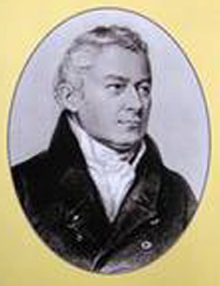Joseph Elkington facts for kids
Quick facts for kids
Joseph Elkington
|
|
|---|---|
 |
|
| Born | Baptised 1 January 1740 Warwickshire, England
|
| Died | October 1806 |
| Resting place | Graveyard of All Saints' Church, Madeley, Staffordshire, England |
| Monuments | In All Saints' churchyard, Stretton-on-Dunsmore, Warwickshire |
| Nationality | English |
| Occupation |
|
| Known for | Improvements to land drainage |
| Relatives | George Elkington (grandson) |
| Awards | £1,000 and gold ring |
Joseph Elkington was an important English farmer and engineer. He was born in Warwickshire in 1740 and died in 1806. He became famous for his clever new ways to drain wet, boggy land. The government even praised him for his work!
Elkington's Clever Ideas
Joseph Elkington was a farmer in Princethorpe, Warwickshire. He came up with a special way to drain very wet, muddy land, also known as boggy land. He did this by digging deep holes called boreholes. These holes helped to remove extra water from the soil.
His new method was very helpful for farming. It meant that land that was too wet to grow crops could now be used. The British Parliament was so impressed that they gave him a reward in 1795. He received £1,000 and a gold ring. This was because they wanted his knowledge to be shared before he became too ill to teach others.
The Board of Agriculture hired a land surveyor named John Johnstone. His job was to study Elkington's methods. This helped to spread Elkington's ideas to other farmers.
Elkington also worked with a famous landscape designer, Lancelot "Capability" Brown. They planned drainage systems for Brown's beautiful gardens and parks. One of their first projects was at Fisherwick Park near Lichfield.
In 1797, Elkington moved to Hey House in Staffordshire. There, he farmed a large area of land, about 500 acres, in Madeley. This farm became known as Bog Farm because of his work with draining wet land.
His Life and Family
Joseph Elkington was the oldest son of Joseph Elkington, who was also a farmer. His mother was Mary Gallimore. Joseph Elkington had a health condition called epilepsy.
He married Sarah Webb on December 26, 1760. They had many children, and nine of them were still alive when Joseph passed away. His grandson, George Elkington, became a well-known industrialist.
Joseph Elkington died at Hay House on October 17, 1806. He was buried three days later in the churchyard of All Saints' Church, Madeley. There is also a monument to him in the churchyard at Stretton-on-Dunsmore. This monument calls him a "pioneer of land drainage." This means he was one of the first and most important people to develop new ways to drain land.
 | Calvin Brent |
 | Walter T. Bailey |
 | Martha Cassell Thompson |
 | Alberta Jeannette Cassell |

